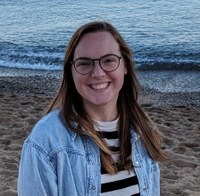George R. Pack Award
The George R. Pack Award for Most Outstanding Chemistry PhD Dissertation was established by colleagues, family and friends to recognize in perpetuity Dr. Pack’s role in growing a vigorous departmental research program, his contributions to the University’s research environment, and his appreciation of the key role that graduate students provide in the research process.
Dr. Emily Kempfer – 2023 George Pack Award Recipient and Speaker

Implementing Multireference Methodologies using
Automated Code Generation
Many technologies we rely on today harness the power of light-reactive molecules. One application which has received significant interest is the control of molecules through light, as well as other external stimuli. Understanding how to control and manipulate molecules with high fidelity is challenging, and requires simulation to understand changes in electronic and nuclear structure under external perturbations. However, computational simulation is also challenging owing to difficulties in describing the multiple electron configurations and energy states involved. In this presentation, I will describe my doctoral research, where I have utilized existing and developed new computational models to understand how reactions over multiple electronic states can be controlled. I'll share the hurdles faced when studying larger and more intricate systems and discuss how I've been using automatic code generators in my postdoctoral work to streamline the code development process and push the boundaries of what's possible in simulation. Overall, this presentation is about finding new ways to improve our understanding of complex molecular processes and paving the way for even more exciting discoveries in the future.
Emily M. Kempfer received her Ph.D. from the University of Louisville in May of 2023 under the guidance of Dr. Lee Thompson. During her graduate career she worked on the development of wavefunction theories for studies of multistate reaction processes, which she applied to the understanding of electric field control of photoisomerization mechanisms. Under Dr. Thompson's guidance, she authored eight research articles and was a mentor to a number of undergraduate researchers, with whom she coauthored five articles, two of whom have since gone on to graduate school in computational chemistry. Following graduation, Emily joined the molecular theory and spectroscopy group at the Max-Planck-Institut für Kohlenforschung in Mülheim an der Ruhr, Germany as a postdoctoral researcher. There, she works with Prof. Frank Neese, a leading figure behind the widely used computational chemistry ORCA program. Her research interests continue to revolve around the refinement and advancement of multistate wavefunction theories, with a particular focus on including three-body interactions in N-electron valence perturbation theory. Throughout Emily's academic journey, her scientific contributions have been honored with several awards, including the John M. Houchens Dissertation Award (2023), the Arno Spatola Endowment Graduate Research Fellowship (2022), and a University of Louisville Graduate School University Fellowship (2018).
Past Recipients
2021 |
Steve P. Cronin, PhD |
2020 |
Ram Hona, PhD |
2019 |
Rene Ebule, PhD |
| 2018 | Kelly Mouapi-Davis, PhD |
| 2017 | Andrew Haddad, PhD |
Shengzong Liang, PhD |
|
| 2016 | Rafael Masitas, PhD |
| 2015 | Ralph Knipp, PhD |
| 2014 | Deepika Malhotra, PhD |
